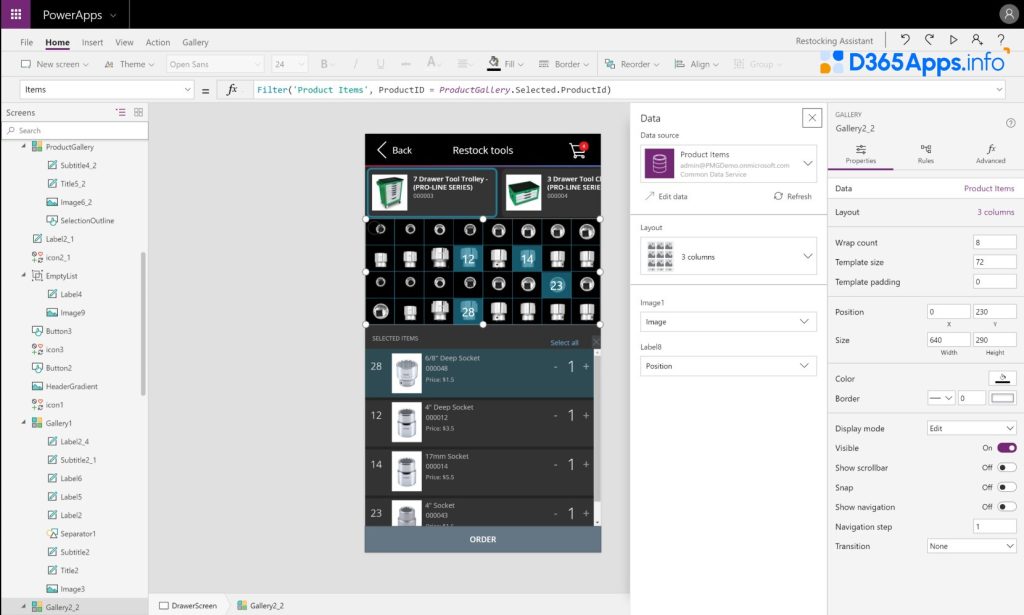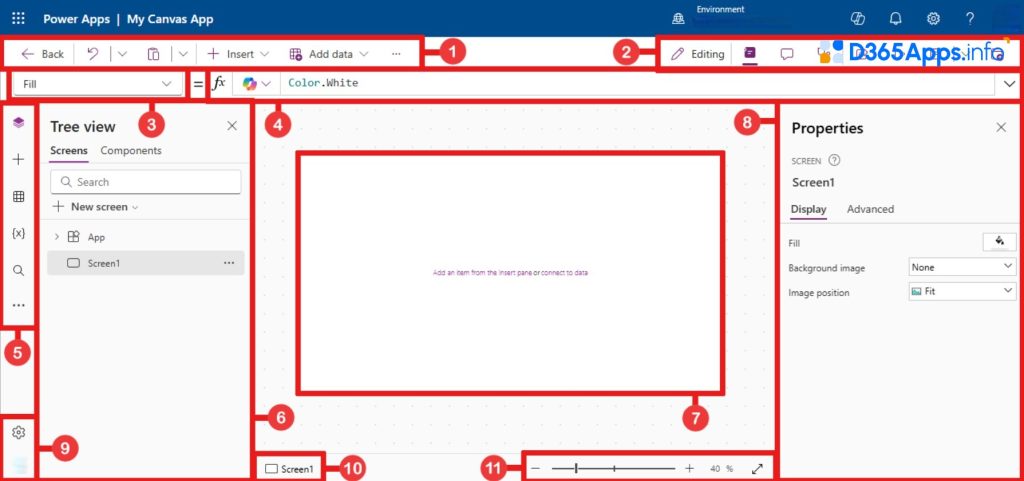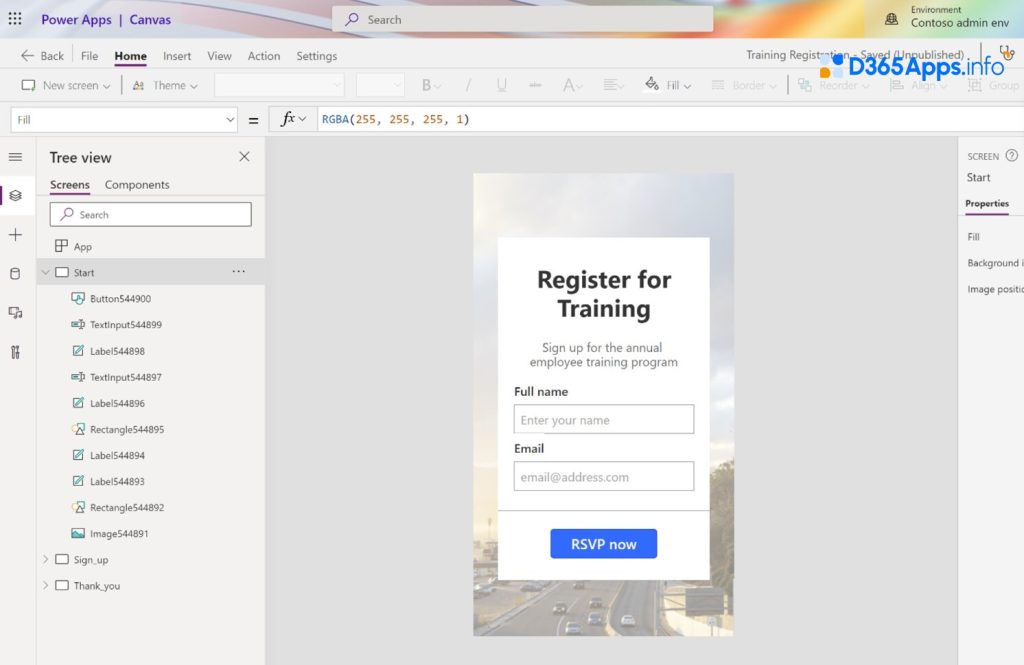Canvas Apps is a part of the Microsoft Power Platform that lets business users and developers who like to learn on their own make their own business apps without having to do any programming. Instead of writing code, you just create a canvas, and then you can place interface elements on it and customize their behavior using Excel-like formulas. This approach gives us flexibility in the design and logic of the app and allows us to respond quickly to business needs.
- Description of the Canvas Apps: 3-Hr Briefing by NETWORG
- Structure of Canvas Apps: 3-Hour Briefing
- Key Elements of the Canvas Apps: 3-Hour Briefing by NETWORG
- Pros and Cons of a Canvas Apps: 3-Hr Briefing by NETWORG
- Typical Scenarios of Using Canvas Apps
- Cost and Conditions of the Canvas Apps: 3-Hr Briefing by NETWORG
- Comparison Canvas Apps: 3-Hr Briefing with Longer Training and Implementation formats
- Conclusion
This agility is reflected in the platform’s adoption: over 25 million users rely on Power Apps monthly, saving millions of hours and speeding app development by 50%, while delivering an average ROI of 206% over three years. Low-code/no-code platforms like Canvas Apps are projected to be used for 70% of new business applications by 2025, significantly reducing development time by 50-90%.
The Dynamics 365 Canvas App specifically excels in connecting to data from diverse sources and integrating seamlessly within the broader Microsoft ecosystem. You can run pre-built apps through a browser, on a mobile device, or embedded into other products for a seamless user experience.
When building apps on the Dynamics 365/Power Apps platform, two main approaches stand out: freely developed Dynamics 365 canvas App vs Model Driven apps. This often leads to the question: which is better for specific business requirements? Considering that 89% of developers have engaged with low-code platforms like Power Apps recently, understanding the strengths and use cases of each app type becomes critical for successful deployment.

Description of the Canvas Apps: 3-Hr Briefing by NETWORG
Canvas Apps: 3-Hr Briefing is a short-term consulting service from NETWORG that will introduce your team to the capabilities of Canvas Apps and show how these technologies can solve your specific business problems. This format is a kind of express training and strategy session lasting about three hours.
The main aim of the briefing is to help you all understand the role of Canvas Apps in solving your company’s business needs. By the end of the session, participants gain clear guidance on how to leverage Canvas Apps to accelerate digital transformation and integrate custom solutions seamlessly within their existing IT environment.
This briefing is especially valuable for organizations seeking to maximize the potential of the Dynamics 365 ecosystem, enabling you to extend and customize your business applications efficiently. To learn more about how different Dynamics 365 app solutions can support various business needs, check out our detailed reviews on Dynamics 365 App implementations and success stories.
Structure of Canvas Apps: 3-Hour Briefing
The main topics and bits that make up the 3-hour Canvas Apps briefing can be split into a few sections.
This is an intro to Power Platform and Power Apps, including a strong focus on Canvas App Dynamics 365 use cases. The session kicks off with an intro that’s aimed at both regular business users and advanced IT professionals, as well as anyone just starting out as a developer.
- What are tables in Dataverse (formerly CDS), how is data storage organized, and how can you use tables in Microsoft Dataverse for applications?
- Processes and automation – an introduction to how business processes are built in Power Platform: from simple workflows to complex business processes and integrations.
- Quick summary of how to connect the Canvas App to other systems and services (like SharePoint, Excel, and third-party APIs).
- Solution Framework – this is the idea of a solution in Power Apps. It explains how solutions work, why they’re needed, and why they’re an important part of application development.
Advanced features and extensions with the code to go with them. While Canvas Apps is all about low-code, the briefing also talks about pro-code for those who are into the more technical side of things.
- Plugins: how to use code (like .NET, JavaScript, etc.) to add more features to Power Apps, create your own server-side plugins, use the CI/CD pipeline
- Custom Code Activities – examples of writing custom actions in processes that can then be called from applications
- Source code management and ALM. Version control and application lifecycle tools, like using a Git repository to store the Canvas App as code and deploying using pipelines.
The last block is all about Canvas applications, like what they are, what they’re made up of, and how to use them right. It gives you the lowdown on what a canvas app is, shows real-life examples of interfaces, and talks about common ways they’re used.
- Formulas – here’s how to use expressions (Power Fx formulaic language) to specify the logic of how application components operate.
- Data sources – getting data into the app: working with data sources, like Dataverse tables, SharePoint lists, or other connectors.
- Design and UI/UX: making the app look and feel how users want it to so that it appeals to them.
Whether you’re building standalone apps or integrating with broader Dynamics 365 canvas solutions, this session provides a complete foundation to work smarter and build better.

Key Elements of the Canvas Apps: 3-Hour Briefing by NETWORG
Normally, a 3-hour briefing follows a clear plan that lets you go through all the main topics in the right order in the time you’ve got. Here’s what the session normally looks like:
- In the first hour, you have an overview of the Power Apps platform and what it can do. To kick things off, the experts will give everyone the lowdown on the Power Platform. This includes an intro presentation on how the Power Apps ecosystem is organized, what types of apps there are, and the business value of Canvas Apps. Then break down the basic concepts and show how they work with simple examples. The first hour is all about getting everyone on the same page so we can have a more meaningful discussion.
- In the second hour, take a deep dive into the technical bits and the more advanced topics. Once you’ve got the basics, the briefing moves on to the more complex features of the platform. Now, going to talk about the solution framework and application scaling issues. If the audience includes technical experts, spend a lot of time on the topic of code usage: discuss examples of extending Canvas App with scripts or plugins, and show the lifecycle of application management. Here, the presenters demonstrate practical applications of Dynamics 365 Canvas Tools, including how to manage the app lifecycle and incorporate pro-code approaches when needed.
- Third hour: Taking a look at Canvas Apps in practice and sharing some example solutions. The last part is all about Canvas Apps. Here, the presenters focus on how to build and use Canvas Apps in a practical way. The process of building a simple app from scratch is usually shown, from adding screens and buttons to connecting it to a data source and writing a few formulas for business logic.
Pros and Cons of a Canvas Apps: 3-Hr Briefing by NETWORG
The three-hour introductory briefing format has a number of advantages but also imposes certain limitations. Let’s consider the main pros and cons of such a short format:
Pros of a Canvas App:
- You’ll be producing knowledge quickly. The team gets a lot of information really quickly. This means that managers and specialists can quickly see how useful Canvas Apps could be for their business without having to spend ages on training.
- Minimal distractions from work. 3 hours is a small window that is easy to fit into a schedule. Employees don’t have to leave for a few days for training or drop current tasks for long periods of time.
- The cost of the briefing is fixed and relatively low ($399) compared to longer consulting projects. The low price makes it easy for companies to decide whether to go for it: even a small company can afford this audit and training.
- Personalization of the business. This briefing is different from general webinars or recorded courses because it’s based on your questions and examples. NETWORG consultants specialize in your industry and pick cases that are relevant to your business. This approach adds value because participants see a direct link to real-world challenges and can discuss their case studies immediately.
Cons of a Canvas App:
- It’s not that detailed. The briefing format is more of an overview. It’d be impossible to go through all the different parts of Canvas Apps development in detail or to work through a full implementation scenario in just three hours. The session will give you a rough idea, but it won’t turn you into an expert overnight.
- No practical skills. Even though there have been demonstrations, participants might not get the chance to try to develop the application themselves during the briefing (due to time constraints). The training is a bit of an intro, so you’ll learn how to do it, but might not have time to practice it.
- It depends on the audience. If the group is too diverse, some may find the intro parts boring and others may find the tech parts too tricky. If you’re not prepared to put in the effort, you’ll end up with a watered-down presentation. If you’re working in a longer format, you can split the audience into groups and go through each topic in more detail.
Typical Scenarios of Using Canvas Apps
Canvas Apps can be used in all sorts of business scenarios, especially when you need custom solutions that work alongside standard systems. Here are some common use cases for Canvas Apps:
- Improving what you can do with Dynamics 365. Lots of organizations using the Dynamics 365 platform need to extend its standard functionality to suit their needs. When you’re in a situation like this, a custom Dynamics 365 canvas tool can be a real lifesaver. For example, a company can create a Canvas app for field employees that connects to CRM data (Dataverse) and provides a mobile-friendly interface for viewing and updating customer information right from the phone. This app will work with the main Dynamics module, but it’ll have a totally different user experience, tailored for a specific role.
- Get rid of manual processes and use automated tools instead of Excel. It’s pretty common for companies to use Excel files, email, or paper forms to do things manually. Canvas Apps let you turn such a process into a handy app in no time at all. For example, purchase requests that used to be approved by mail can now be made as an application. An employee fills out a requisition form in the Canvas App, the data is stored in SharePoint or Dataverse, triggers send notifications to managers, and they approve or reject the requisition through the same interface.
- Mobile apps for employees in the field. Canvas apps are great for creating mobile solutions for specific needs. For example, inspectors can use a tablet to check equipment. They can mark the condition of nodes, attach photos, and immediately generate a report. The data is sent straight to the main system (whether it’s Dynamics 365 Field Service or another database), so there’s no need for any extra manual input. You can set up the Canvas App interface however you like, depending on the conditions of work in the field. You can choose large buttons, offline mode, and GPS tracking, for example.

Cost and Conditions of the Canvas Apps: 3-Hr Briefing by NETWORG
The Canvas Apps: 3-Hour Briefing at Microsoft AppSource costs $399 per session. The price covers the initial prep and the session itself by NETWORG experts. Usually, a few people from the customer’s side can join the briefing, and the payment is made for the whole event, not per person. Just order the service through the AppSource Marketplace – click the “Contact me” button on the offer page and fill in your details. We can also give briefings for customers from different countries. The event will be in English. When it comes to the tech stuff, all you need is a computer with internet access and, if you’ve got it, some tools for showing off Power Apps. When it comes to costs, $399 is a small investment for strategic value.
Comparison Canvas Apps: 3-Hr Briefing with Longer Training and Implementation formats
To get a better idea of where the 3-hour briefing fits in with all the other services, let’s compare it to longer formats like full-fledged workshops that last for several days or Canvas Apps implementation projects. Here’s a quick comparison table to help you out:
| Parameter | 3-hour briefing | Multi-day workshop/implementation project |
|---|---|---|
| Duration | ~3 hours (one-time) | A few days to weeks (a series of sessions or phases) |
| Purpose | Getting to know Canvas Apps and understanding what they can do, as well as how they can be used in a business context. | You’ll get to really dive in and practice your skills, or even implement a specific solution on Canvas Apps (up to a finished application). |
| Table of Contents | The topics are covered in a basic way, with stuff like an overview of the platform, demos, and answers to questions. We’ll personalize it to the client’s requirements, but without going into loads of detail about every single aspect. | You’ll get to really dive in and learn all the nitty-gritty of what we do. In the workshop, you’ll be developing the application components yourself, with the trainer there to guide you. Then, in the implementation project, the consultants will gather requirements, develop, and launch the application for the customer. |
| Resources and materials | Presentations, live demo examples, and methodological explanations. You have some reference materials (like links to documents and slides) after the briefing. | You’ve got full training plans, handouts, and practical exercises. If you’re thinking of implementing this, you’ll need the technical documentation, the application source code, and the support instructions. |
| Result for the client | Need to raise awareness and decide on the next steps, like picking a pilot case for Canvas Apps or thinking about developer training. | Talk about specific artifacts here, like a group of employees who’ve been trained and are able to create applications independently or a turnkey Canvas application that’s all set to go. Also, a detailed report and roadmap for developing the Power Platform in the organization. |
| Cost | Low – on the order of a few hundred dollars (fixed). Available for small businesses. | It can be significantly higher, ranging from a few thousand to tens of thousands of dollars, depending on the scope. For example, the estimate for a 2-week project with NETWORG is around $2700, and for a more complex project, the price can be calculated individually. You’ll need to allocate budget and resources. |
Conclusion
Canvas Apps: NETWORG’s 3-hour briefing is a great way to learn about the power of Power Apps and how they can help your business. Acting as a concise Canvas solution review, the session lets you grasp the technology in no time and see real-world examples and ask questions of professionals who have experience implementing solutions on the platform.
For many organizations, this briefing is the starting point; it makes it far easier to make an informed decision about using Canvas Apps in the future-whether that means choosing a pilot project, investing in developer training, or ordering a full implementation. Obviously, you can’t cover every nuance or create a complex application in three hours, but that isn’t the goal here. Once your company has a basic understanding, it can move forward more confidently and explore broader initiatives such as a Canvas Dynamics solution review, implementing new applications for process automation, and gradually expanding Power Platform usage. In the end, the success of Canvas Apps hinges on the people who use them, so a quick chat with our consultants is an excellent way to gain the fundamentals and set yourself up for success.

Oleksandr is a passionate technical professional with extensive expertise in Microsoft Dynamics 365 Customer Engagement (D365 CE) customization, Canvas App development, and Power Automate solutions. His skill set includes Azure Function and Azure Durable Function development, Logic Apps, and seamless integration of PCF components into Canvas Apps. With a deep understanding of Azure technologies and a strong background in developing tailored solutions for D365, Oleksandr brings a comprehensive and forward-thinking approach to enterprise application development. He enjoys exploring new Microsoft solutions and shares his insights with the readers.
